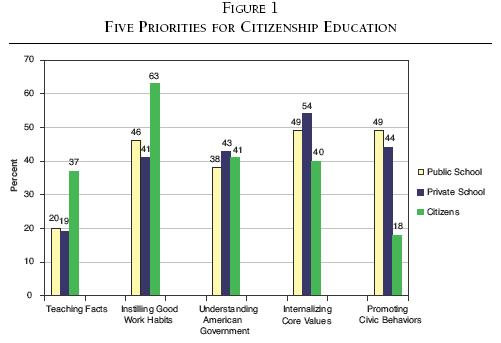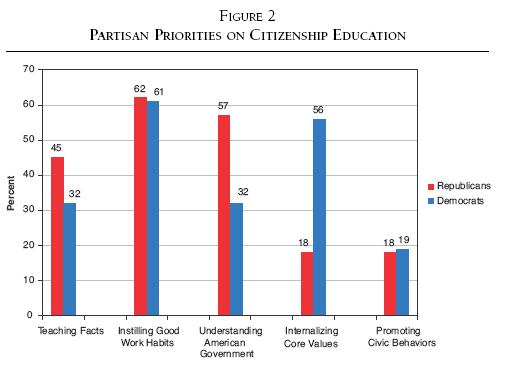- Facebook58
- Threads
- Bluesky
- Total 58
A perfect citizen would know an enormous range of facts, concepts, and skills, from macroeconomics to how to chair a meeting, from the contents of the Federalist Papers to the principles of statistics. (See my list in this HuffingtonPost article.) In practice, schools must decide what is most important to teach in the limited hours available to them. I value facts about politics and government and related academic concepts, but my highest priority would be the arts and habits of association that De Tocqueville thought were the basis of successful democracy in America. Unless citizens can successfully manage projects and groups, we are left to the mercies of the state and market. Further, by co-managing our own associations, we develop reasonable ideas about how to address larger public issues.
I find good news and bad news in a new American Enterprise Institute report entitled Contested Curriculum: How Teachers and Citizens View Civics Education. Good news: teachers, especially in public schools, generally share my goals and priorities. Bad news: American citizens do not.
In the following graph, snipped from that report, “Public School” means the opinions of social studies teachers in public schools. “Private School” refers to social studies teachers in private schools. “Citizens” means a representative sample of 1,000 adult Americans. The bars bear simplified labels. For example, “Teaching facts” is short for: “It is absolutely essential [for students] to know facts (e.g., the location of the 50 states) and dates (e.g., Pearl Harbor).”
Look at the last cluster of columns, showing that while teachers think it is important to promote civic behaviors, citizens do not.
That first graph reveals one political obstacle for people who share my priorities: we are in the minority. Another–equally familiar–problem is the partisan split. Basically, Republicans are considerably more supportive of facts and academic concepts than Democrats are. But Democrats are more sympathetic to values. For instance, teaching students “To be tolerant of people and groups who are different from themselves” (one component of the bar shown below as “Internalizing core values”) seems “absolutely essential” to 31% of Republicans and 69% of Democrats.
Standards (official guidelines for what should be taught) tend to include all of the above priorities. That is the path of least resistance for policymakers: just add everything to the list. But the emphasis in classrooms is not determined by standards; it is much more shaped by tests. To the extent that states require tests of civics, almost all the content involves facts and academic principles.
In short, citizens, and especially Republican citizens, are getting an educational policy closer to what they want than to what teachers (and I) would prefer.


I like this, “the arts and habits of association.” Your article makes me think of two things – what are our “schools of democracy” today, in the post Bowling Alone America? Second, I wonder how much of the citizens’ attitudes reported above might be rooted in a perhaps unfounded believe that Americans do “well enough” learning these skills outside of school, a sort of “competence bias”? As Americans do we assume the content and skills are are too value-laden, we know that stuff anyway, and what we don’t know we can acquire through life’s day-to-day interactions anyway?
Hi Lars, It’s a useful survey and I’m glad they did it, but it raises all kinds of questions about how citizens define civic behaviors, what they think schools mean by civic behaviors, what they think about our actual behaviors, etc. I’d love to see follow-up research.
Pingback: AEI Citizenship – Blogging round-up